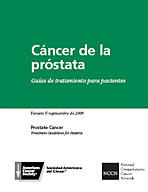Findings for Provenge vaccine in prostate cancer patients with realy stage recurrence
June 2, 2007. -- Data from an ongoing study designed to explore the biologic and clinical activity of cancer immunotherapy sipuleucel-T, or Provenge, in patients with early stage recurrent prostate cancer who have a rising serum prostate specific antigen (PSA) level, but who have not yet developed metastatic disease were presented today by Oregon Health & Science University Cancer Institute researchers.
The study showed that sipuleucel-T did not significantly delay the time it took for a patient's PSA to reach a value of 3 ng/ml, the primary endpoint of the study, but it did show a prolongation in prostate-specific antigen doubling time (PSADT).
In addition, there was a trend observed in slowing the time to metastatic disease for patients who received sipuleucel-T compared with those who received placebo, but this early trend did not reach statistical significance.
The findings were presented at the 43rd Annual Meeting of the American Society of Clinical Oncologists (ASCO) in Chicago.
 "While there was no delay in the time to PSA recurrence, we did observe a slowing in the rate of rise of serum PSA in exploratory analyses. Additional follow-up is needed to determine if this effect on PSA will translate into patient benefits," said Tomasz Beer, M.D., lead investigator, director of the Prostate Cancer Research program at the OHSU Cancer Institute; and associate professor of medicine, (hematology/medical oncology) OHSU School of Medicine.
"While there was no delay in the time to PSA recurrence, we did observe a slowing in the rate of rise of serum PSA in exploratory analyses. Additional follow-up is needed to determine if this effect on PSA will translate into patient benefits," said Tomasz Beer, M.D., lead investigator, director of the Prostate Cancer Research program at the OHSU Cancer Institute; and associate professor of medicine, (hematology/medical oncology) OHSU School of Medicine.
The ongoing trial, known as P-11, is a double-blind, multi-center, randomized, placebo-controlled study involving 176 men, all of whom had prostatectomies and then had recurrent cancer as detected by a rise in the serum tumor marker, PSA. After three months of hormone therapy, 117 men received sipuleucel-T and 59 received placebo. Sipuleucel-T was found to have a favorable safety profile. The most common side effects seen more commonly in sipuleucel-T-treated patients were fatigue, chills and fever.
The effects of sipuleucel-T on prostate cancer progression were analyzed in several ways using measurements of serum PSA. The primary analysis focused on time until the PSA reaches 3.0 ng/ml. Although there was a trend, the immunotherapy did not significantly delay cancer progression by this measure. However, investigators found the rate at which PSA was rising was 30 percent to 48 percent slower in patients who received sipuleucel-T compared to those who received placebo.
After patients' PSAs reached 3.0 ng/ml, they became eligible for one booster infusion of either sipuleucel-T or placebo in accordance with the treatment arm to which they were randomized. An immune monitoring protocol performed in a subset of patients demonstrated that the immune response elicited by sipuleucel-T was long-lived and still strong just prior to the booster infusion, which occurred an average of 21 months following initial treatment with the immune stimulating agent.
Following a booster infusion of sipuleucel-T, patients demonstrated an immune response approximately 10- to 100-fold higher than measured in placebo arm patients.
Sipuleucel-T is manufactured by Dendreon Corporation. An FDA advisory committee recently supported the safety and effectiveness for the use of sipuleucel-T in men with metastatic, androgen- independent prostate cancer (a different and more advanced patient population than those observed in this study). The FDA has delayed the approval of sipuleucel-T until more clinical data are available from an ongoing study, known as IMPACT. If approved, sipuleucel-T would be the first FDA-approved treatment designed to train the body's own immune system to fight cancer.
ASCO abstract 5059:
Randomized trial of active cellular immunotherapy with sipuleucel-T in androgen dependent prostate cancer (ADPC). Journal of Clinical Oncology, 2007 ASCO Annual Meeting Proceedings Part I. Vol 25, No. 18S (June 20 Supplement), 2007: 5059.
Author(s):
T. M. Beer, G. T. Bernstein, J. M. Corman, M. L. Glode, S. Hall, W. L. Poll, P. F. Schellhammer, Y. Xu, L. Yu, M. W. Frohlich
Abstract:
Background: Sipuleucel-T is an investigational, active cellular immunotherapy product for prostate cancer. To explore the potential benefit in ADPC, sipuleucel-T was studied in a randomized, double blind, multicenter, placebo controlled study, P-11.
Methods: ADPC patients with a rise in serum prostate specific antigen (PSA) as the only sign of disease recurrence after prostatectomy were randomized (2:1) to sipuleucel-T or placebo, administered in weeks 0, 2, and 4, following 3-months of hormonal therapy. PSA kinetics were evaluated by time to biochemical failure (BF), defined as any PSA = 3 ng/mL (primary endpoint), as well as PSA doubling time (PSADT). Clinical endpoints included time to distant metastases (DF) and survival. The effect of a single booster infusion of sipuleucel-T on the immune system was also evaluated.
Results: 176 patients were randomized (117 sipuleucel-T:59 placebo) and analyzed by intent to treat. Median time to BF was 18.0 months for sipuleucel-T and 15.4 months for placebo (hazard ratio (HR)=0.94 [95% confidence interval (CI): 0.64, 1.38]; p>0.05, log rank). The hazard ratio for BF was 0.80 in favor of sipuleucal-T ([95%CI: 0.53, 1.20], p>0.05) when the analysis was restricted to patients with a confirmed BF. An analysis of PSADT calculated from 90 days following randomization to BF or the initiation of systemic therapy demonstrated that patients randomized to sipuleucel-T had a 35% increase in PSADT (125 vs 91 days; p=0.046, F-test). PSADT calculated after testosterone recovery to baseline levels demonstrated a 48% increase in PSADT for the sipuleucel-T arm (155 vs 105 days; p=0.038). Only 16% of patients developed distant metastases. The hazard ratio for time to DF was 0.78 (95%CI: 0.34, 1.58, p>0.05, log rank). Patients are still being followed for DF and survival. The most common treatment-associated adverse events were chills, fatigue, headache, and pyrexia, which were primarily Grade 1-2.
Conclusions: Time to BF was not different between the two study arms. The effect on PSADT, an important prognostic indicator in ADPC, may suggest the biologic activity of sipuleucel-T in this population. Additional follow-up for clinical endpoints of DF and survival is of interest.
Source: ASCO and
The OHSU Cancer Institute, which is "the only National Cancer Institute-designated center between Sacramento and Seattle." More than 200 clinical trials are conducted at the OHSU Cancer Institute.
Related
Novacea and Schering-Plough Enter Into Worldwide Development and Commercialization Agreement for Asentar, a Novel Treatment for Prostate Cancer. May 30, 2007
Vitamin D, Taxotere Combination Promising For Advanced Prostate Cancer Aug 8, 2005
Inflammation May Play Role in Metastasis of Prostate Cancer March 19, 2007
Genetic marker linked to aggressive prostate cancer Twice as Common in African American Men May 20, 2007
Recently
PSA Velocity is a Signficiant Marker of Prostate Cancer in Older Men as Well as in Younger Men May 31, 2007
Robotic Surgery May Improve Survival Rate For Prostate Cancer Patients May 23, 2007
Photodynamic Molecular Beacon May Target Tumors and Minimize Side Effects May 15, 2007
New "Collar" Reconstruction Procedure During Robotic Prostate Surgery Speeds Recorvery of Urinary Incontinence, Team Says May 12, 2007
Ack1 Molecule Is a Trigger of Advanced Prostate Cancer Recurrence May 9, 2007
Brachytherapy After Beam Radiation Cures 3 out of 4 Prostate Cancer Patients Long-Term, Seattle Team Says January 5, 2007
Find Life-Threatening Prostate Cancer by Measuring PSA Velocity During a "Window of Curability" Nov 1, 2006
Sometimes No Treatment is Best Option for Low-Risk Prostate Cancer, Says M. D. Anderson Team March 22, 2006
This page made and last edited by J. Strax, June 1, 2007.
Information on this web site is not intended as medical advice nor to be taken as such. Consult qualified physicians specializing in the treatment of prostate cancer. Neither the editors nor the publisher accepts any responsibility for the accuracy of the information or consequences from the use or misuse of the information contained on this web site.
 About Us | Site Archive | Content Policy/Disclaimer | Privacy Policy
About Us | Site Archive | Content Policy/Disclaimer | Privacy Policy
 "While there was no delay in the time to PSA recurrence, we did observe a slowing in the rate of rise of serum PSA in exploratory analyses. Additional follow-up is needed to determine if this effect on PSA will translate into patient benefits," said Tomasz Beer, M.D., lead investigator, director of the Prostate Cancer Research program at the OHSU Cancer Institute; and associate professor of medicine, (hematology/medical oncology) OHSU School of Medicine.
"While there was no delay in the time to PSA recurrence, we did observe a slowing in the rate of rise of serum PSA in exploratory analyses. Additional follow-up is needed to determine if this effect on PSA will translate into patient benefits," said Tomasz Beer, M.D., lead investigator, director of the Prostate Cancer Research program at the OHSU Cancer Institute; and associate professor of medicine, (hematology/medical oncology) OHSU School of Medicine.



